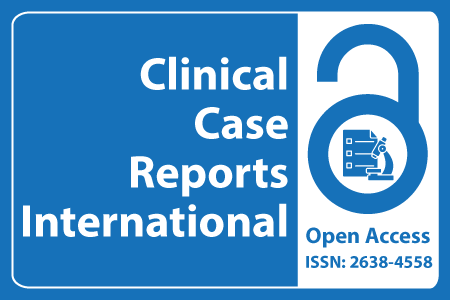
Journal Basic Info
- Impact Factor: 0.285**
- H-Index: 6
- ISSN: 2638-4558
- DOI: 10.25107/2638-4558
Major Scope
- ENT
- Gerontology
- Neurological Surgery
- Diabetology
- Hepatology
- Physical Medicine & Rehabilitation
- Virology
- Cardiac Surgery
Abstract
Citation: Clin Case Rep Int. 2024;8(1):1652.DOI: 10.25107/2638-4558.1652
Media Role on the Burden of Non-Communicable Diseases in Nigeria
Obada AA, Airaoje OK, Okuneye AP, Collins-Dike J and Msughter AE
Department of Microbiology, University of Calabar, Nigeria
Liverpool John Moores University, UK
Department of News and Current Affairs, Nigerian Television Authority, Lagos, Nigeria
Department of Development Communication, Rivers State University, Port Harcourt, Nigeria
Department of Mass Communication, Caleb University, Lagos, Nigeria
*Correspondance to: Aondover Eric Msughter
PDF Full Text Review Article | Open Access
Abstract:
One way of keeping in touch with our contemporary world is through the media. Communication is a vital component of our lives and existence and no society has been known to exist without it. However, due to rapid urbanization, westernization of lifestyles and diets, and other factors, the burden of Non-Communicable Diseases (NCDs) is rising globally, with developing countries bearing the brunt of the increase. The primary cause of illness and mortality worldwide is now Non-Communicable Diseases (NCDs). Out of 56 million fatalities worldwide in 2012, 38 million were due to NCDs, and 28 million of these deaths happened in low- and middle-income nations. It is predicted that by 2030, the number of these deaths will rise from 38 million in 2012 to 52 million, with a significant increase occurring in low- and middle-income nations, which already have a significant burden of communicable diseases (a double burden of disease). The finding of the study also revealed that there are three main key factors of NCDs and these include age, diet, and economic context. The study discovers that some of the challenges in fighting non-communicable diseases in Nigeria include lack of awareness and education, limited healthcare infrastructure, healthcare funding, medical equipment, lifestyle and behavioral factors, cultural practices, limited diagnostic tools and treatment, etc. The findings of the study revealed that the problem of noncommunicable diseases in Nigeria can be mitigated through awareness and education, healthcare infrastructure strengthening, affordability and accessibility, preventive healthcare, community engagement, data collection and research, regulatory measures, empowerment and support, etc. The study recommends that the Nigerian government should partner with international organizations, Non-Governmental Organizations (NGOs), private sectors, and academia to launch nationwide awareness campaigns in order to educate the nation about the risk factors, symptoms, and preventive measures related to non-communicable diseases.
Keywords:
Healthcare; Non-communicable diseases; Epidemiologic transition; Cancer; Diabetes
Cite the Article:
Obada AA, Airaoje OK, Okuneye AP, Collins-Dike J, Msughter AE. Media Role on the Burden of Non- Communicable Diseases in Nigeria. Clin Case Rep Int. 2024; 8: 1652.













